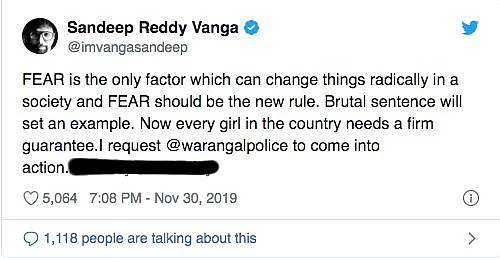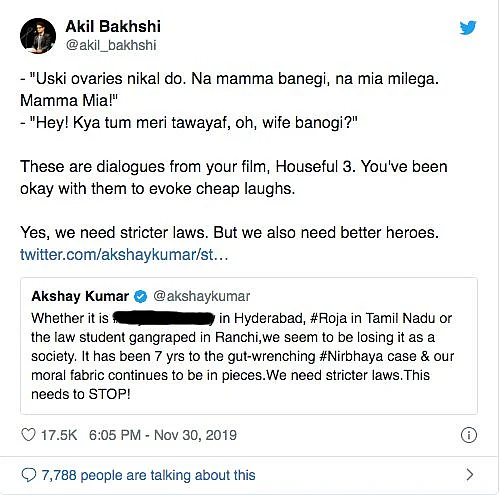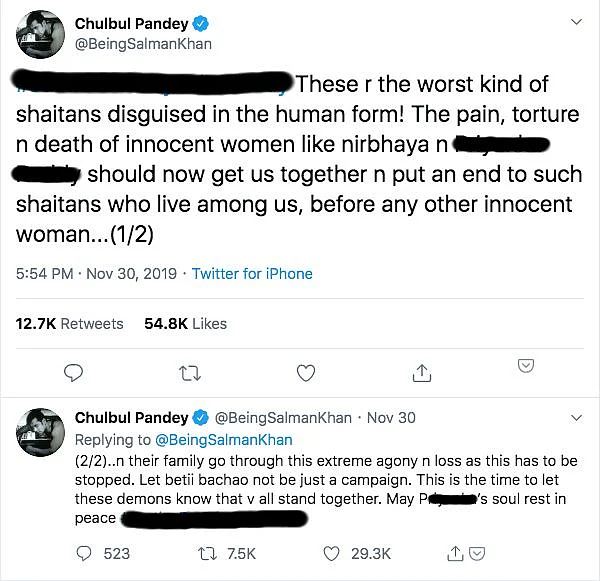As news of the brutal gang rape and murder of a young doctor in Hyderabad on 28 November spread across social media, several celebrities took to Twitter to express their outrage – as one does in 2019. You cannot ignore the irony that one of the first to speak out was Telugu star Vijay Deverakonda, who wrote in a note: “We all need to take the responsibility of the boys/men in our homes, our friends and in our surroundings. Stand up to any wrong behaviour, correct them, make them understand.”
This sentiment would have made perfect sense had it not come from a man whose most celebrated role is that of the titular Arjun Reddy, an unapologetic misogynist who treats women like his property and whose behaviour is enabled by passive peers.

Arjun Reddy director Sandeep Reddy Vanga also weighed in, only to be called out by other Twitter users who referenced an interview with Anupama Chopra where Vanga defended Kabir Singh – the Hindi version of the film – claiming that when someone is deeply in love, it could lead to justifiably violent behaviour. Here is a man advocating for women’s safety, while he sees no problem including a scene where the lead character pulls a knife on a woman after she refuses to consent to sleep with him, with the film’s gaze glorifying rather than chastising him.
Celebrities have as much of a right to voice their opinions as anyone else, but their plastic outrage means little when their actions say otherwise.
Take Akshay Kumar, who was quick to lament about how our “moral fabric continues to be in pieces”. India’s patriot-in-chief could do with a break from patting himself on the back for his films on “women empowerment”, such as Padman or Mission Mangal, and reflect on his idea of comedy.

His 2010 film Tees Maar Khan, directed by Farah Khan and co-starring Katrina Kaif, contained the dialogue, “Tawaif ki luti izzat bachaana aur Tees Maar Khan ko kaid karna, dono bekaar hai! (To restore a prostitute’s honour and to capture Tees Maar Khan are both impossible tasks.)”
The line got the attention of the CBFC which eventually passed it without any changes. In a clip from a promotional event for the film, Akshay proudly announces that the dialogues from Tees Maar Khan are “quirky” and offers this line as an example.
As one Twitter user pointed out, his 2016 comedy Housefull 3 – a franchise that’s made crores out of casual sexism and racism – contained lines such as “Uski pouches (ovaries in this context) nikal do. Na mamma banegi, na mia milega. Mamma Mia! (Remove her ovaries. She will neither become a mother, nor find a man.)” and a running joke where a character with a speech impediment says tawaif instead of wife, giving rise to gems like, “Kya tum meri tawaif – oh – wife banogi?”

Then in 2017, the actor “jokingly” told his co-judge, comedian Mallika Dua on The Great Indian Laughter Challenge, “Mallika ji aap bell bajao, main aapko bajata hoon.”
One could argue that it’s unfair to dig up these instances, that they were meant in jest, and that one learns and grows over time. To which we must continue screaming from the rooftops – there’s nothing funny about rape or the patriarchal idea that a woman is nothing more than her honour, which is apparently ensconced in her vagina.
As for the bit about learning and growing? How do you explain these lines: “Oh madam goggles wali, don't go yoon deke gaali. Haan gundon se chhudaya hai, maine tujhe bachaya hai, ek chumma toh banta hai.” They’re from ‘Ek Chumma’, a song from Akshay’s 2019 release Housefull 4, where his character saves Kriti Sanon from goons and feels entitled to a kiss from her at the very least.
Bollywood’s poster boy of machismo Salman Khan too took to Twitter with a strong message condemning the crime.

While his words are valid, his actions in the past have failed to reflect his sentiments.
This is a man who has been physically abusive to past girlfriends, and once said he felt like a “raped woman” while playing a wrestler in his 2016 film Sultan. “When I used to walk out of that ring, it used to be actually like a raped woman walking out,” he said talking about his gruelling schedule. He is often dismissive of his female co-stars, and his behaviour is passed off as Bhai being Bhai. During a press conference ahead of the release of Bharat, Salman took a potshot at Priyanka Chopra, accusing her of turning down the film to marry Nick Jonas. “She (Priyanka Chopra), over Bharat, did choose USA in the 'nick' of time. She has worked so hard all her life, okay? And when she got the biggest film of her life, she dumped that film and got married. You know, hats off! Usually, people leave their husbands for a film like this,” he said. In another interview with Bollywood Hungama, the Dabangg actor was asked to suggest an alternate career for his co-star Katrina Kaif. To which he responded, “She should be married and produce children.”
Most recently, the makers of Kartik Aaryan and Bhumi Pednekar-starrer Pati, Patni Aur Woh received backlash after including a sequence in the trailer where Kartik tells his friend that if a man requests for sex from his wife he is labelled a bhikari (beggar), if he does not have sex with her, he is an atyachari (cruel man) and if somehow he manages to convince her through “jugaad”, he is branded a balatkari (rapist). They later agreed to remove the dialogue from the film saying that they never intended to “hurt sentiments”. Which begs the question: what was such a line doing there in the first place? Did a scriptwriter, producer or actor ever raise an issue with it? According to Kartik Aaryan, apparently not. “The dialogue was highlighted and we didn’t realise it while we were shooting for Pati, Patni Aur Woh. However, when the trailer came out we realised we shouldn’t have used the word at all,” he said in response to the flak.
So, before baying for blood and claiming to be champions of women’s rights, it’s important that celebrities take a moment to reflect on the implications that their films and statements to the public have on their audience. As long as the film industry continues to implicitly let casual sexism slide for a few laughs, conveniently stand up for causes as long as individual careers remain unaffected and lets men run the show without holding space for women, any protests in the name of women’s rights will be in vain.
(At The Quint, we are answerable only to our audience. Play an active role in shaping our journalism by becoming a member. Because the truth is worth it.)
